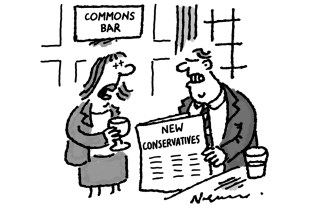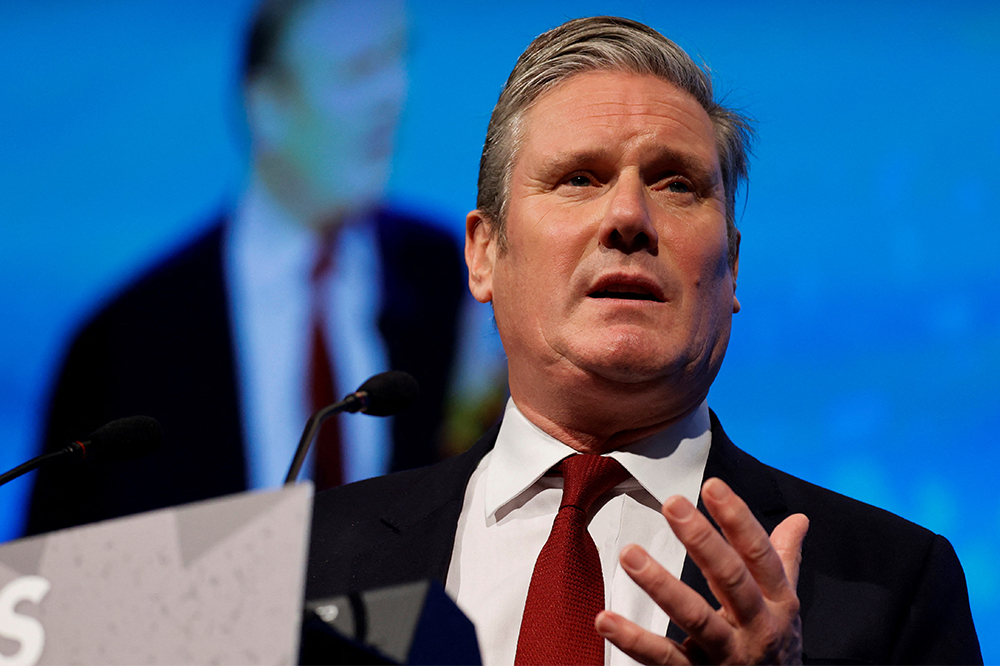The Labour party is preparing for power and the unions are deciding what role they might play. Friend or foe? Rachel Reeves, the shadow chancellor, has already incited their ire by refusing to commit to accepting independent pay-review body recommendations. Unite, the second-largest trade union, this week debated cutting ties with Labour and starting its opposition early.
There is growing anxiety from the left that Starmer is abandoning party traditions in the pursuit of power
The motion was, in the end, rejected. ‘The Labour party has decided we want to win,’ insisted one party figure. The union hit back. It insisted that Starmer has been ‘put on notice’ and that the union’s support (including a still-powerful get-out-the-vote operation) was not to be taken for granted. Sharon Graham, Unite’s general secretary, went further, arguing the pre-election months represent ‘the moment of maximum leverage for the union where we can hold Labour to account’. There is growing anxiety from the left that Starmer is abandoning Labour’s traditions in the pursuit of power.
The Tories were quick to try to exploit the spat. It shows who really pulls the strings, they said. This is a familiar line from the Conservatives: under Jeremy Corbyn, the then Unite leader Len McCluskey was regularly portrayed as a puppet-master. Along with Karie Murphy, Seumas Milne and the former Communist party member Andrew Murray, he was part of a group that made up the ‘four Ms’ or ‘the quad’. Centrist Labour MPs blamed ‘the quad’ for everything from Corbyn’s fiscal ineptitude to his lukewarm support for staying in the EU.
Now there is a concerted effort to suggest the opposite. Starmer and his shadow cabinet are keen to show they can stand up to the unions, which is why Sam Tarry has been sacked for the seemingly minor offence of giving interviews on a picket line.
The boos that greeted Bridget Phillipson, shadow education secretary, on a National Education Union conference were also politically useful: they draw attention to the tearing up of a Corbyn-era pledge to abolish the schools inspectorate Ofsted. Meanwhile Wes Streeting, the shadow health secretary, has been revelling in the criticism of the British Medical Association, offering this as evidence that he is willing to take the hard decisions in office.

The unions see all of this quite clearly. Unite’s threat to disaffiliate is intended to be a warning to Starmer not to go too far. ‘They’re running a risk of pushing the unions so far away that they cut fees or eventually all ties,’ cautions one trade union figure. But while Starmer would rather the unions stay in the tent, he is in a position to gamble: his party received more money last year from private companies and donors than it did from the unions. ‘We’ve moved past the old days of trade union barons marching in and calling the shots,’ says one party figure. Big Labour donors include the Blairite donor Waheed Alli and the recruitment mogul Peter Hearn.
Starmer the longtime lawyer is not a natural trade unionist – but his deputy Angela Rayner has close links to Unison from her time as an official there. It’s one of the three most important unions alongside Unite and GMB. They are all affiliated, which means they donate money to Labour and vote on key party issues both at conference and on the national executive committee. Other unions such as the RMT – led by Mick Lynch – are not affiliated and have less influence.
Holding the balance of power on the committee is crucial to having party rules in one’s favour. It’s allowed Starmer to take control of the candidate selections with more input from central office (though some candidates will still have union support). ‘In the snap elections, the unions would gather and start going through who got what seat,’ explains one party old hand. While Reeves won’t make pay pledges, Rayner’s pledge for a charter on workers’ rights – including gig economy workers becoming eligible for sick pay – has been broadly welcomed and there is a plan to bring it in in the first 100 days. This is a key part of the offer to the unions.
At present, Unison – representing many health workers and carers – is generally the most supportive of the three unions, having been first to back Starmer in the leadership campaign. The GMB, representing workers in industrial sectors, is viewed as wielding the greatest influence on policy. This is in large part due to its leader, Gary Smith, who gets on with Reeves and wins admirers in unlikely places. ‘Gary’s a good guy,’ says one No. 10 aide, citing his pragmatism.
The union is pro-defence, pro-Trident and sceptical about ‘green jobs’, thinking their main contribution is in counting dead birds around wind turbines or filling London-based PR positions. The GMB influence can be seen in Labour softening its policies on new oil and gas licences, as well scaling down the £28 billion-a-year plan for green investment. ‘It needs to be industrial strategy,’ says one figure privy to conversations. That means the GMB is playing a role in the Labour debate about how far to row back on the green agenda, mindful of the voter backlash against it in Europe. ‘The green rose we almost had at Labour conference as a logo is a long time ago now,’ says one party figure. ‘It needs to be economy first, green second.’ Ed Miliband, backed by MPs on the left of the party, is still pushing for the green agenda to be a key priority but faces opposition.
Ahead of each election, the Labour shadow cabinet holds a formal manifesto meeting – know as Clause V – with its affiliated unions. In the past it has seen union leaders – when they meet after the election is called – debate the various parts of the manifesto and union representatives call for changes and tweaks. Next year, Starmer will likely feel emboldened to shrug many of these off. He has purged the Labour party of Corbynism and moved it into a position where he’s seen as being overwhelming likely to become prime minister – so for now, at least, the unions need him more than he needs them. It could be that the big showdown with the unions, in which the Tories had placed so much hope, has come and gone.






Comments